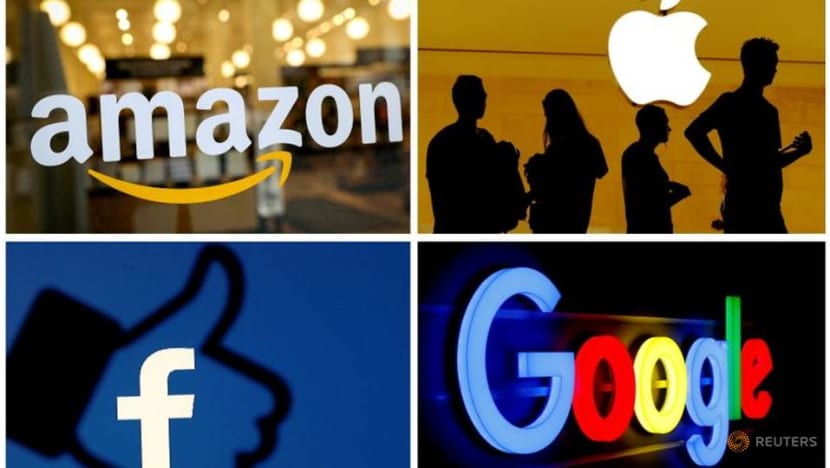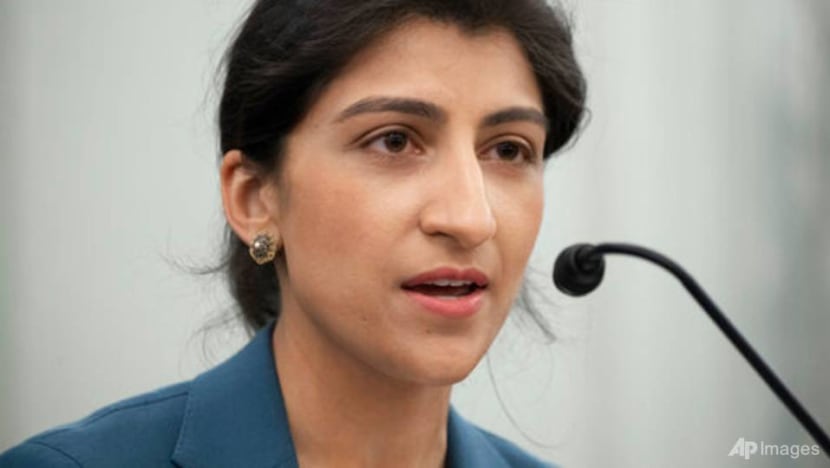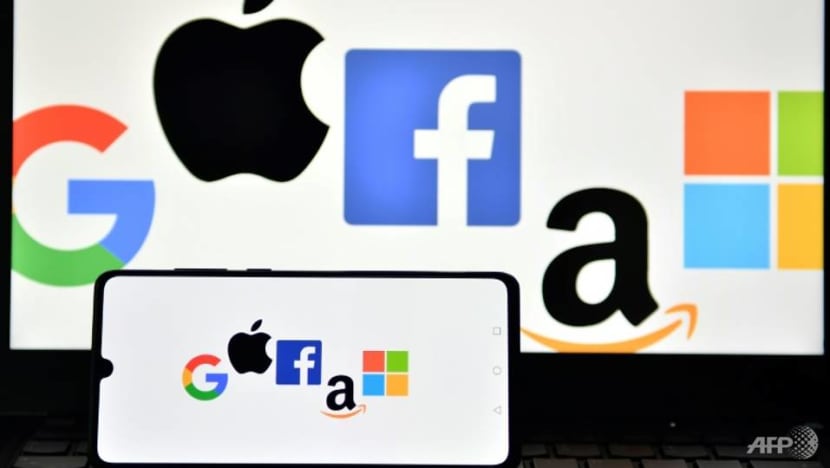Commentary: One of Big Tech’s biggest critics is now its regulator. This has implications for users globally
The Biden administration's choice to lead a federal agency could bring changes for users of Amazon, Apple, Facebook and Google, says NTU’s Mark Cenite

The logos of Amazon, Apple, Facebook and Google in a combination photo. (Photo: Reuters)
SINGAPORE: Imagine that Facebook no longer owns Instagram and WhatsApp.
Rather than wondering how much these social networks and messaging apps share your data with advertisers, they may compete on how much they protect your privacy.
If you tire of these social networks, perhaps you and your friends could easily transfer your network, photos and data to a new app.
Now, picture being able to change all the defaults on your phone, even messaging and photos apps.
And if you’re an iPhone user, envision cheaper apps you could download from other places besides the Apple app store.
All these scenarios may not stay hypothetical for long.
READ: Commentary: Instagram has too many influencers and people are getting bored
AN APPOINTMENT THAT SIGNALS CHANGE
Earlier this month, US President Joe appointed Lina Khan, 32, a Columbia Law School professor, to chair the Federal Trade Commission, which enforces anti-trust law.
The move came hours after the US Senate confirmed her appointment as one of the commission's five members in a rare bipartisan vote: 69 in favour and 28 opposed.
Only four years out of law school, Khan shot to prominence by criticising decades of lax enforcement of anti-trust law by both Republicans and Democrats dating back to Ronald Reagan's presidency in the 1980s.
In her Senate confirmation hearing, Khan did not spare what she called the Obama administration's "missed opportunity" to block tech giants’ mergers.
The signal is clear. The Biden administration is departing from decades of a hands-off, free-market approach to the private sector.
AN ICONOCLASTIC VISION
Khan is the youngest-ever FTC chair but has the novel ideas and government experience appropriate for the role.
Her groundbreaking 2017 article advocating anti-trust scrutiny of Amazon, published in the Yale Law Journal while she was still a law student, attracted far wider attention in Washington than most legal scholarship.
Khan had a prominent role in a congressional investigation of Big Tech. In 2019, the House Judiciary anti-trust subcommittee launched a probe of the tech giants’ anti-competitive practices, and Khan served as counsel to the subcommittee’s Democratic majority.
She helped author the majority report finding that Amazon, Apple, Facebook, and Google exercised monopoly power. The report concluded that though these firms once were “scrappy, underdog startups that challenged the status quo”, they were now “the kinds of monopolies we last saw in the era of oil barons and railroad tycoons”.
READ: Commentary: Anti-trust laws needed against Big Tech firms that have too much power
In the wake of the report, House members have just introduced six bills, with bipartisan support, to regulate Big Tech.
Khan’s appointment has been called a nightmare for tech giants. She rejects the decades-long anti-trust orthodoxy, dubbed the “consumer welfare” approach, which has held the US government back from breaking up any company since AT&T in 1982.
Khan argues that because its proponents find anti-trust violations only when a firm uses monopoly power to raises prices, it is outdated. In the digital economy, services are low-cost or free but users pay with their attention, which Big Tech tries to capture with ads.
Khan advocates a longer-term focus on maintaining the competition that sparks innovation.

HERE’S WHAT MIGHT CHANGE
Each of the tech giants deserves anti-trust scrutiny, Khan argues.
Facebook bought Instagram in 2012 and WhatsApp in 2014 before they could become serious rivals to it — thus constraining competition and, ultimately, innovation and consumer choice.
That missing innovation may not be just cool new photo filters. If Facebook products didn’t dominate social media and messaging, there might be more varied competition on approaches to privacy protection.
It may be a long shot, but Khan and the proposed House legislation could open the door to unwinding such acquisitions.
At the very least, a large firm may face greater scrutiny when it attempts to acquire a smaller firm that could later become a rival, or when it attempts to gain market share in a new sector.
READ: Commentary: SPACs are all the rage now but few aware of hidden dangers
These would be timely developments as Big Tech giants eye artificial intelligence start-ups.
If undoing mergers fails to win support, a less drastic alternative could promote competition: A service like Facebook could be required to make our user data easily portable to another network, reducing hassles that may discourage us from switching.
The House report that Khan had a hand in also concluded that Google has monopoly power in search, and has favoured its products like Google Maps in search results, practices that American and European regulators have targeted.
READ: Commentary: America's growing anti-trust movement is gathering momentum

The House report points out that although Amazon calls third-party sellers on its platforms “partners”, Amazon sells competing products, an arrangement that incentivises Amazon to spy on its competitors.
Amazon could, for example, have studied the sales of computer cables on its platform before it offered its own house brand. Amazon also could have engaged in predatory pricing — pricing its own cables so low, at least in the short term, that it put competitors out of business.
One of the new proposed House bills would prohibit a platform like Amazon from selling house-branded products that compete with third-party products it sells, a possibility Khan has raised.
Apple, whose apps like Photos compete with third-party offerings, could also be forced to allow users to delete its pre-installed default apps to reduce the phone maker’s upper hand over competitors.
Trustbusters, including Khan, criticise Apple for allowing iPhone and iPad apps to be distributed only through its app store.
Apple says this ensures the security and smooth operation of its ecosystem. Apple takes a 30 per cent cut of the revenue of third-party apps. Epic Games, the maker of Fortnite, has sued Apple over these practices. Anti-trust action could allow users to download apps directly from their creators at lower prices.
(The changes to WhatsApp's terms and conditions are not sweeping, so why the huge reaction? Experts explain how users will be affected on CNA's Heart of the Matter podcast.)
A MAVERICK IN A BUREAUCRACY
The moment seems ripe for anti-trust action. Such suits against Google and Facebook initiated during the Trump administration are already winding their way through the courts. European regulators are also proceeding against the tech giants.
Khan won't be a lone progressive voice. President Biden appointed Khan's colleague from the Columbia University law faculty, Tim Wu, as special assistant to the president for technology and competition at the National Economic Council. Though his new advisory role is not clearly defined, he is another pioneering advocate of anti-trust action against Big Tech.
But Khan may find that executing an idealistic agenda requires compromise. Congress makes the law, and new laws may not get passed.
Khan's job also requires persuasion. Three of the five FTC commissioners' votes are needed for it to act. The commission’s actions also may be challenged in the courts, so Khan must convince federal judges steeped in orthodox anti-trust views.
READ: Commentary: What if another widespread Internet outage happens?
So far, Khan has shown an ability to win support. On the far right, Josh Hawley was among the 21 Republican senators who joined Democrats in voting to confirm her.
The election of Joe Biden, who doesn’t shy from bold government initiatives like his massive infrastructure plan, shows the American public's new openness to the possibility that government can intervene in markets to do good.
Khan’s term on the commission is seven years. The American president elected in 2024 will have the option to retain her as chair or appoint a new one.
If she can continue to rally support for her bold vision, tech users worldwide like you and I will feel her impact.
Dr Mark Cenite is Associate Dean (Undergraduate Education) at Nanyang Technological University’s College of Humanities, Arts, & Social Sciences. He teaches communication law at the Wee Kim Wee School of Communication and Information.















